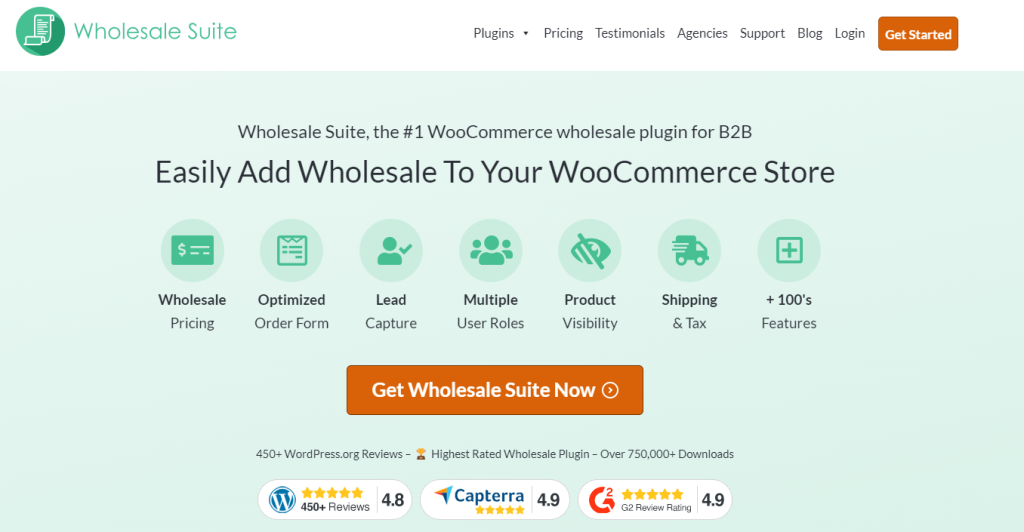
If there’s one thing entrepreneurs have learned in the past couple of years, then it’s how rapid shifts happen in the modern business landscape. This applies in the wholesale industry as well, where changes can significantly impact supply chains and customer expectations. The key to navigating the changes and emerging trends in wholesaling is to stay informed and proactive.
We’re here to help you do just that! In this article, we’ll explore key strategies to help your wholesale business stay ahead of the curve and thrive. So, without further ado, let’s dive straight into it!
Understanding The Current Wholesale Landscape
The wholesale industry is alive and thriving, continuing to be one of the most lucrative industries to venture into. According to industry estimates, the wholesale market size is expected to see strong growth in the next few years, projected to reach approximately $68 trillion by 2028, with a compound annual growth rate of 6.5%. To stay competitive and take advantage of emerging opportunities in this market, then it’s crucial to understand the emerging trends in wholesaling.
We’ve covered key trends in wholesaling in detail in one of our recent articles, “5 Wholesaling Trends Shaping The Future Of Wholesale Businesses”, so be sure to check it out:

Let’s quickly walk through some of the most important wholesaling trends below:
- The rise of e-commerce: According to an industry survey by McKinsey & Company, B2B e-commerce has taken the lead as the most effective marketing channel, and key decision-makers are now willing to spend up to $500,000 on a single e-commerce transaction. As the shift toward online purchasing continues to accelerate, wholesale companies must integrate their wholesale operations online.
- Data-driven decision-making: It has become increasingly crucial to leverage the power of data analytics to make informed decisions. By uncovering data on customer behavior, market trends, and operational performance, wholesalers can identify areas for improvement and opportunities for growth.
- Supply chain disruptions: Natural disasters, geopolitical events, and other unforeseen circumstances can quickly shift supply and demand. Therefore, to mitigate risks, it’s essential to diversify and invest in robust supply chain management systems.
6 Strategies To Navigate Trends In Wholesaling And Stay Ahead Of The Curve
As the business landscape continues to evolve, it’s essential to establish systems that will help you navigate emerging trends and unforeseen changes. In this section, we’ll walk you through 6 actionable tips to help you stay ahead of trends in wholesaling and overcome potential challenges.
1. Embrace digital transformation
Going digital is no longer an option but a necessity if you want to thrive in today’s market. This step entails adopting new technologies and solutions to bring your operations online, improve overall efficiency, and meet evolving customer expectations. Fortunately, there is an abundance of tools and technologies to make this process as seamless as possible.
For instance, wholesalers can leverage all-in-one solutions like Wholesale Suite to effortlessly integrate their wholesale operations with e-commerce platforms like WooCommerce. With this tool, you can easily set wholesale prices across your inventory, create bulk order forms, capture B2B leads, and offer flexible payment terms.
Below, let’s explore key solutions that make a significant impact on your business:
- E-commerce integration: Tools like Wholesale Suite enable you to adapt to emerging trends in wholesaling by bringing your wholesale business online and meeting the growing demand for online purchasing.
- Digital marketing: Implementing digital marketing strategies such as SEO optimization, email marketing, and content planning can help boost your online presence so your target customers can find you.
- Customer relationship management (CRM): These tools allow you to track customer interactions and automate marketing campaigns to engage customers, improve retention rates, and build customer loyalty.
- Automated inventory management: Inventory management technologies allow you to track stock levels in real-time and ensure timely replenishment of inventory. This is crucial in wholesale, where customer satisfaction requires having the right products available at the right time.
2. Get involved in your industry
Keep up with trends in wholesaling by participating in your industry. There are several ways you can stay in the know. For example, you can join relevant industry events and conferences in your field. These events present wonderful opportunities to learn about best practices, news, and emerging trends in your niche. Moreover, they allow you to meet and network with other professionals, which can lead to valuable collaborations and partnerships.
Another easy way to stay on top of the latest news and developments is by joining online communities and forums. These virtual spaces allow you to share, ask questions, and learn from others in the industry. Platforms like LinkedIn, for example, offer groups where you can engage in discussions and gain insights from fellow professionals in your field.
It’s also a worthwhile endeavor to build thought leadership. Showcase your industry expertise by publishing articles or hosting webinars. This is an excellent way to build your reputation and establish your authority in the field, which is crucial for success in the wholesale industry.
3. Adopt a culture of innovation
In a rapidly evolving business landscape, the work doesn’t end when you find something “that works”. To thrive long-term, you need to adopt a culture of innovation. This entails continuously seeking new ways, technologies, and processes that improve your business operations. Spearhead this approach by encouraging your team to share their ideas, think outside the box, and stay on top of industry advancements.
It’s also important to encourage active collaboration. Allow teams to work on shared goals and initiatives. Let’s take the marketing and customer service team as an example. Both teams work closely with customers, yet from different perspectives. By collaborating, these teams can share valuable insights to enhance the overall customer experience.
For instance, marketing can use feedback from customer service to develop content and campaigns that address customer pain points, while customer service can use marketing insights to better understand customer product expectations.

By fostering a culture of innovation and collaboration, you can ensure your business remains informed and adaptable to the latest trends in wholesaling.
4. Prioritize customer-centric strategies
Putting your customers at the heart of everything you do is essential to the long-term success of your business. To keep them coming back, your services and offerings should be able to meet their needs and expectations. Prioritizing your customers allows you to build stronger relationships and foster customer loyalty, which is crucial to your business’ sustainability.
Here are some key tips to consider:
- Know your customers: This is the crucial first step–take time to understand their needs, preferences, and challenges. Consider creating a detailed B2B persona and analyzing existing customer data to learn what your customers value the most.
- Collect and act on customer feedback: Listen to your customers and use their feedback to make improvements to your services and processes. This demonstrates your commitment to their satisfaction, fostering trust and loyalty. Some ways to gather feedback include surveys, reviews, or customer service interactions.
- Empower your customers with self-service options: One of the key trends in wholesaling is the growing demand for self-service options. Empower your customers with tools and knowledge–provide FAQs, knowledge bases, ordering systems, and customer portals where they can find solutions and place their orders.
- Focus on personalization: Use the wealth of data you already have to provide your wholesale customers with tailored experiences. For example, you can provide product recommendations and offers based on their purchase history.
5. Develop strong supplier relationships
According to industry insights, supply chain disruptions worldwide are on the rise. To build a more resilient supply chain, it’s crucial to foster strong supplier relationships. Having reliable partners allows you to adapt and remain agile amidst market and demand changes.
Instead of frequently switching suppliers, focus on cultivating long-term supplier relationships built on trust, open communication, and fair terms. Some key ways to foster better supplier relationships include:
- Ensuring timely payments: Paying on time demonstrates your reliability and commitment to your suppliers. Ensuring that invoices are promptly settled strengthens your supplier partnerships and makes them more likely to prioritize your needs.
- Maintain open communication: Make sure to update your suppliers regularly about any changes in your needs to prevent any misunderstandings. It’s also important to provide constructive feedback when necessary.
- Negotiate fair terms: Aim for win-win negotiations that benefit both you and your suppliers.
6. Invest in employee training and development
Investing in upskilling and training can help your team keep up with emerging trends in wholesaling. After all, to fully take advantage of new technologies and processes, it’s crucial to equip your team with the right skills and knowledge.
Start by assessing the current skill levels of your team to pinpoint any skill gaps that can be improved. Then, tailor your training programs to address these gaps effectively. Here are some of the most relevant trainings that can be beneficial in today’s business landscape:
- Data analytics: Analyzing and interpreting data to make informed decisions.
- Digital marketing: SEO, content marketing, social media marketing, and more.
- Cybersecurity: Securing passwords, recognizing phishing attempts, and protecting sensitive data.
- Sales: B2B sales strategies, negotiation, and relationship building.
- Leadership: Communication, team management, and strategic planning.
To make the most of new technologies and processes, it’s also important to ensure proper onboarding and integration. Provide hands-on training sessions or relevant documentation to ensure your team can utilize these new technologies effectively.
Conclusion
Keeping up with emerging trends in wholesaling means being proactive. This entails taking aligned action to keep your business resilient and adaptable to market changes and shifts. In this article, we explored six actionable strategies on how your business can navigate the ever-evolving wholesale landscape.
To summarize, let’s review them below:
- Embrace digital transformation
- Get involved in your industry
- Adopt a culture of innovation
- Prioritize customer-centric strategies
- Develop strong supplier relationships
- Invest in employee training
In an increasingly digital landscape, all-in-one solutions like Wholesale Suite allows you to bring your entire wholesale operations online. This comprehensive solution features four powerful plugins that allow you to manage wholesale pricing, create bulk order forms, capture B2B leads, and offer flexible payment terms to wholesale customers.
Do you have any questions about this topic? Which strategy are you most excited to try? Let us know in the comments section below!






